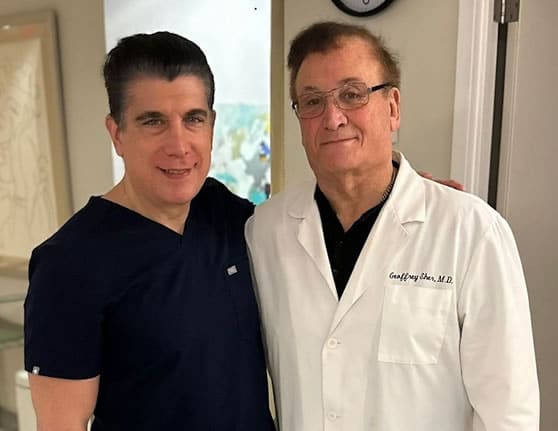Answer:
When women with infertility due to endometriosis seek treatment, they are all too often advised to first try ovarian stimulation (ovulation Induction) with intrauterine insemination (IUI) ………as if to say that this would be just as likely to result in a baby as would in vitro fertilization (IVF). Nothing could be further from reality It is time to set the record straight. And hence this communication!
Bear in mind that the cost of treatment comprises both financial and emotional components and that it is the cost of having a baby rather than cost of a procedure. Then consider the fact that regardless of her age or the severity of the condition, women with infertility due to endometriosis are several fold more likely to have a baby per treatment cycle of IVF than with IUI. It follows that there is a distinct advantage in doing IVF first, rather than as a last resort.
So then, why is it that ovulation induction with or without IUI is routinely offered proposed preferentially to women with mild to moderately severe endometriosis? Could it in part be due to the fact that most practicing doctors do not provide IVF services but are indeed remunerated for ovarian stimulation and IUI services and are thus economically incentivized to offer IUI as a first line approach? Or is because of the often erroneous belief that the use of fertility drugs will in all cases induce the release (ovulation) of multiple eggs at a time and thereby increase the chance of a pregnancy. The truth however is that while normally ovulating women (the majority of women who have mild to moderately severe endometriosis) respond to ovarian stimulation with fertility drugs by forming multiple follicles, they rarely ovulate > 1 (or at most 2) egg at a time. This is because such women usually only develop a single dominant follicle which upon ovulating leaves the others intact. This is the reason why normally ovulating women who undergo ovulation induction usually will not experience improved pregnancy potential, nor will they have a marked increase in multiple pregnancies. Conversely, non-ovulating women (as well as those with dysfunctional ovulation) who undergo ovulation induction, almost always develop multiple large follicles that tend to ovulate in unison. This increases the potential to conceive along with an increased risk multiple pregnancies.
So let me take a stab at explaining why IVF is more successful than IUI or surgical correction in the treatment of endometriosis-related infertility:
- The toxic pelvic factor: Endometriosis is a condition where the lining of the uterus (the endometrium) grows outside the uterus. While this process begins early in the reproductive life of a woman, with notable exceptions, it only becomes manifest in the 2ndhalf of her reproductive life. After some time, these deposits bleed and when the blood absorbs it leaves a visible pigment that can be identified upon surgical exposure of the pelvis. Such endometriotic deposits invariably produce and release toxins” into the pelvic secretions that coat the surface of the membrane (the peritoneum) that envelops all abdominal and pelvic organs, including the uterus, tubes and ovaries. These toxins are referred to as “the peritoneal factor”. Following ovulation, the egg(s) must pass from the ovary (ies), through these toxic secretions to reach the sperm lying in wait in the outer part the fallopian tube (s) tube(s) where, the sperm lie in waiting. In the process of going from the ovary(ies) to the Fallopian tube(s) these eggs become exposed to the “peritoneal toxins” which alter s the envelopment of the egg (i.e. zona pellucida) making it much less receptive to being fertilized by sperm. As a consequence, if they are chromosomally normal such eggs are rendered much less likely to be successfully fertilized. Since almost all women with endometriosis have this problem, it is not difficult to understand why they are far less likely to conceive following ovulation (whether natural or induced through ovulation induction). This “toxic peritoneal factor impacts on eggs that are ovulated whether spontaneously (as in natural cycles) or following the use of fertility drugs and serves to explain why the chance of pregnancy is so significantly reduced in normally ovulating women with endometriosis.
- The Immunologic Factor: About one third of women who have endometriosis will also have an immunologic implantation dysfunction (IID) linked to activation of uterine natural killer cells (NKa). This will require selective immunotherapy with Intralipid infusions, and/or heparinoids (e.g. Clexane/Lovenox) that is much more effectively implemented in combination with IVF.
- Surgical treatment of mild to moderate endometriosis does not usually improve pregnancy potential:. The reason is that endometriosis can be considered to be a “work in progress”. New lesions are constantly developing. So it is that for every endometriotic seen there are usually many non-pigmented deposits that are in the process of evolving but are not yet visible to the naked eye and such evolving (non-visible) lesions can also release the same “toxins that compromise fertilization. Accordingly, even after surgical removal of all visible lesions the invisible ones continue to release “toxins” and retain the ability to compromise natural fertilization. It also explains why surgery to remove endometriotic deposits in women with mild to moderate endometriosis usually will fail to significantly improve pregnancy generating potential. In contrast, IVF, by removing eggs from the ovaries prior to ovulation, fertilizing these outside of the body and then transferring the resulting embryo(s) to the uterus, bypasses the toxic pelvic environment and is therefore is the treatment of choice in cases of endometriosis-related infertility.
- Ovarian Endometriomas: Women, who have advanced endometriosis, often have endometriotic ovarian cysts, known as endometriomas. These cysts contain decomposed menstrual blood that looks like melted chocolate…hence the name “chocolate cysts”. These space occupying lesions can activate ovarian connective tissue (stroma or theca) resulting in an overproduction of male hormones (especially testosterone). An excess of ovarian testosterone can severely compromise follicle and egg development in the affected ovary. Thus there are two reasons for treating endometriomas. The first is to alleviate symptoms and the second is to optimize egg and embryo quality. Conventional treatment of endometriomas involves surgical drainage of the cyst contents with subsequent removal of the cyst wall (usually by laparoscopy), increasing the risk of surgical complications. We recently reported on a new, effective and safe outpatient approach to treating endometriomas in women planning to undergo IVF. We termed the treatment ovarian Sclerotherapy. The process involves; needle aspiration of the “chocolate colored liquid content of the endometriotic cyst, followed by the injection of 5% tetracycline hydrochloride into the cyst cavity. Such treatment will, more than 75% of the time result in disappearance of the lesion within 6-8 weeks. Ovarian sclerotherapy can be performed under local anesthesia or under conscious sedation. It is a safe and effective alternative to surgery for definitive treatment of recurrent ovarian endometriomas in a select group of patients planning to undergo IVF
I am not suggesting that all women with infertility-related endometriosis should automatically resort to IVF. Quite to the contrary…. In spite of having reduced fertility potential, many women with mild to moderate endometriosis can and do go on to conceive on their own (without treatment). It is just that the chance of this happening is so is much lower than normal.
IN SUMMARY: For young ovulating women (< 35 years of age ) with endometriosis, who have normal reproductive anatomy and have fertile male partners, expectant treatment is often preferable to IUI or IVF. However, for older women, women who (regardless of their age) have any additional factor (e.g. pelvic adhesions, ovarian endometriomas, male infertility, IID or diminished ovarian reserve-DOR) IVF should be the primary treatment of choice.
I strongly recommend that you visit www.DrGeoffreySherIVF.com. Then go to my Blog and access the “search bar”. Type in the titles of any/all of the articles listed below, one by one. “Click” and you will immediately be taken to those you select. Please also take the time to post any questions or comments with the full expectation that I will (as always) respond promptly.
- The IVF Journey: The importance of “Planning the Trip” Before Taking the Ride”
- Controlled Ovarian Stimulation (COS) for IVF: Selecting the ideal protocol
- IVF: Factors Affecting Egg/Embryo “competency” during Controlled Ovarian Stimulation (COS)
- The Fundamental Requirements For Achieving Optimal IVF Success
- Use of GnRH Antagonists (Ganirelix/Cetrotide/Orgalutron) in IVF-Ovarian Stimulation Protocols.
- Anti Mullerian Hormone (AMH) Measurement to Assess Ovarian Reserve and Design the Optimal Protocol for Controlled Ovarian Stimulation (COS) in IVF:
- The Role of Immunologic Implantation Dysfunction (IID) & Infertility (IID): PART 1-Background
- Immunologic Implantation Dysfunction (IID) & Infertility (IID): PART 2- Making a Diagnosis
- Immunologic Dysfunction (IID) & Infertility (IID): PART 3-Treatment
- Thyroid autoantibodies and Immunologic Implantation Dysfunction (IID)
- Immunologic Implantation Dysfunction: Importance of Meticulous Evaluation and Strategic Management: (Case Report)
- Intralipid and IVIG therapy: Understanding the Basis for its use in the Treatment of Immunologic Implantation Dysfunction (IID)
- Intralipid (IL) Administration in IVF: It’s Composition; how it Works; Administration; Side-effects; Reactions and Precautions
- Natural Killer Cell Activation (NKa) and Immunologic Implantation Dysfunction in IVF: The Controversy!
- Treating Out-of-State and Out-of-Country Patients at Sher-IVF in Las Vegas
- Should IVF Treatment Cycles be provided uninterrupted or be Conducted in 7-12 Pre-scheduled “Batches” per Year
- A personalized, stepwise approach to IVF
- How Many Embryos should be transferred: A Critical Decision in IVF?
- Endometriosis and Immunologic Implantation Dysfunction (IID) and IVF
- Endometriosis and Infertility: Why IVF Rather than IUI or Surgery Should be the Treatment of Choice.
- Endometriosis and Infertility: The Influence of Age and Severity on Treatment Options
- Early -Endometriosis-related Infertility: Ovulation Induction (with or without Intrauterine Insemination) and Reproductive Surgery Versus IVF
- Treating Ovarian Endometriomas with Sclerotherapy.
- Effect of Advanced Endometriosis with Endometriotic cysts (Endometriomas) on IVF Outcome & Treatment Options.
- Deciding Between Intrauterine Insemination (IUI) and In Vitro Fertilization (IVF).
- Intrauterine Insemination (IUI): Who Needs it & who Does Not: Pro’s &
- Induction of Ovulation with Clomiphene Citrate: Mode of Action, Indications, Benefits, Limitations and Contraindications for its use
- Clomiphene Induction of Ovulation: Its Use and Misuse!
______________________________________________________
ADDENDUM: PLEASE READ!!
INTRODUCING SHER FERTILITY SOLUTIONS (SFS)
Founded in April 2019, Sher Fertility Solutions (SFS) offers online (Skype/FaceTime) consultations to patients from > 40 different countries. All consultations are followed by a detailed written report presenting my personal recommendations for treatment of what often constitute complex Reproductive Issues.
If you wish to schedule an online consultation with me, please contact my assistant (Patti Converse) by phone (800-780-7437/702-533-2691), email (concierge@SherIVF.com) or, enroll online on then home-page of my website (www.SherIVF.com).
PLEASE SPREAD THE WORD ABOUT SFS!
Geoff Sher









